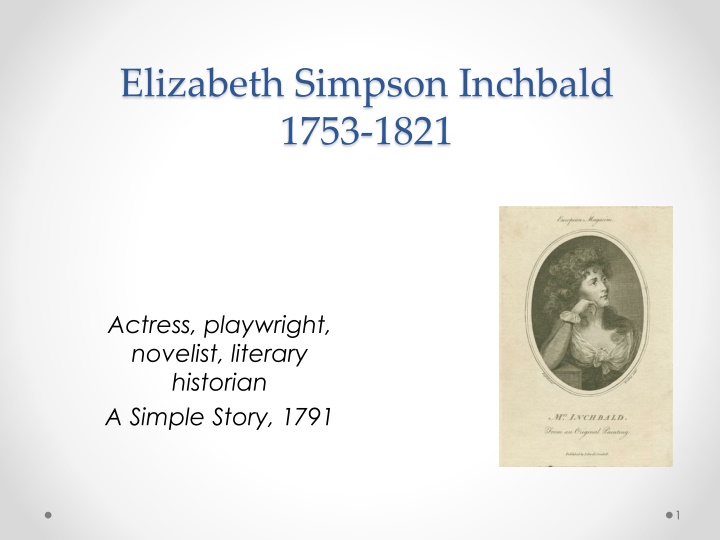
Elizabeth Simpson Inchbald: Actress, Playwright, Novelist
Explore the life and works of Elizabeth Simpson Inchbald, a talented actress, playwright, and novelist from the 18th century. Discover her notable plays, novels, and critical/editorial work, including "A Simple Story" and "Lovers' Vows". Delve into the themes of education and formal problems in her works, offering a glimpse into her literary contributions.
Download Presentation

Please find below an Image/Link to download the presentation.
The content on the website is provided AS IS for your information and personal use only. It may not be sold, licensed, or shared on other websites without obtaining consent from the author. If you encounter any issues during the download, it is possible that the publisher has removed the file from their server.
You are allowed to download the files provided on this website for personal or commercial use, subject to the condition that they are used lawfully. All files are the property of their respective owners.
The content on the website is provided AS IS for your information and personal use only. It may not be sold, licensed, or shared on other websites without obtaining consent from the author.
E N D
Presentation Transcript
Elizabeth Simpson Inchbald 1753-1821 Actress, playwright, novelist, literary historian A Simple Story, 1791 1
Inchbalds life & work Next Door Neighbours (1791) Everyone has his Fault (1793) To Marry, or not to Marry (1793) The Wedding Day (1794) Wives as They Were and Maids as They Are (1797) Lovers' Vows (1798) The Wise Man of the East (1799) The Massacre (1792) (not performed) A Case of Conscience (published 1833) The Ancient Law (not performed) The Hue and Cry (unpublished) Plays Mogul Tale; or, The Descent of the Balloon (1784) Appearance is against Them (1785) I'll Tell you What (1785) The Widow's Vow (1786) The Midnight Hour (1787) Such Things Are (1787) All on a Summer's Day (1787) Animal Magnetism (1788?) The Child of Nature (1788) The Married Man (1789) 2
Extensive writing & acting Young Men and Old Women (Lovers No Conjurers) (adaptation of Le M chant; unpublished) Novels A Simple Story (1791) Nature and Art (1796) Critical/editorial work The British Theatre. 25 vols. (1806 09) Collection of Farces and Afterpieces. 7 vols. (1809) The Modern Theatre. 10 vols. (1811) A Simple story, published in 1791 but begun much earlier is the work her moder reputation rests on. Lovers Vows : the play that Austen s characters in Mansfield Park decide to stage. 3
The problem in A Simple Story is supposed to be a flawed education Taken for granted: This novel is about education. It was included in Erasmus Darwin s A plan for the conduct of female education, in boarding schools (1797). But early reviews contested this view: o The great defect in the fable, says the Impartial Reviewer, is that the wrong education of Miss Milner is not anywhere evident as the cause of any misconduct (378). So what do you think? 4
Formal problems That A Simple Story has formal problems is one of the central interpretive stories about it. It breaks into two almost separate novels. One of our questions: What do the formal problems have to do with the thesis that this is an education novel? 5
Looking at particular episodes At breakfast on her first morning in Lord Dorriforth s household: o Miss Milner has no regard for the deferential sociability required toward elders, strangers, and priests. o in some respects I am like you Roman Catholics; I don t believe from my own understanding, but from what other people tell me (70). 6
Responses of the characters around her Miss Woodley ejaculated a short prayer to herself, that heaven would forgive her young friend the involuntary sin of ignorance (71). Mrs. Horton, unperceived as she imagined, made the sign of the cross upon her forehead to prevent the infectious taint of heretical opinions (71) Result of this scene: Miss Milner s lack of tact, her overt impoliteness may imply blame, but It recedes as the narrator s delineation of the religious gestures around her create Mrs. Horton as a comically obtuse figure. 7
How does the scene sort out, ethically? What kind of standing does Miss Milner have? What do we think about Miss Milner and her setting? Mrs. Horton has no ethical weight against Miss Milner. A matter of form:Inchbald repeatedly moves encounters of conflict, some of them very aggressive, toward comedy. What is the trajectory of this novel? 8



![Lec [2] Health promotion](/thumb/274962/lec-2-health-promotion-powerpoint-ppt-presentation.jpg)